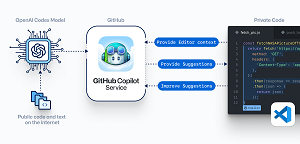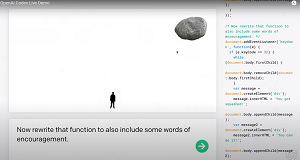News
Visual Studio 2022 Now Does GitHub Copilot, the 'AI Pair Programmer'
GitHub Copilot, the AI-driven coding assistant described as a "pair programmer," is now available from Visual Studio 2022 -- to those already enrolled in the technical preview.
The potentially game-changing tech drew many "ooohs" and "aaahs" from the developer community -- and a fair amount of debate about ethics and security -- when it was unveiled last summer for Visual Studio Code.
"We've been building GitHub Copilot together with the incredibly talented team at OpenAI for the last year, and we're so excited to be able to show it off today," said Nat Friedman, CEO of GitHub, in a June 29, 2021, Hacker News post. "Hundreds of developers are using it every day internally, and the most common reaction has been the head exploding emoji. If the technical preview goes well, we'll plan to scale this up as a paid product at some point in the future."
 [Click on image for larger view.] GitHub Copilot (source: GitHub).
[Click on image for larger view.] GitHub Copilot (source: GitHub).
It has been much improved since then along with its backing tech, a breakthrough AI system called Codex that was created by Microsoft partner OpenAI. It has amazed developers with its ability to provide whole-line code completions and even construct entire development projects like a simple game solely from typed commands. Verbal commands are surely on the horizon, so you will probably be able to tell your computer to "spin up a web server" and see it done.
 [Click on image for larger view.] Turning Words into Code (source: OpenAI).
[Click on image for larger view.] Turning Words into Code (source: OpenAI).
Now, if you're among the lucky, you can try it out with VS 2022.
"Since we launched GitHub Copilot into technical preview last year, we've been busy learning from the feedback we've been receiving as well as expanding the numbers of people with access to the technical preview and the places where you can use it," said GitHub's Martin Woodward in a March 29 blog post. "Today, we are adding our top requested IDE: Visual Studio 2022."
Of course, you have to get on the waitlist first.
"While spaces are limited, we are continuing to add more developers into the preview as we increase capacity of the service," Woodward said.
If you are lucky enough to join the preview, the company wants to hear from you.
"We're really excited to see what you think of GitHub Copilot in Visual Studio and get your feedback, especially on the .NET Languages," Woodward said. "Try writing some unit tests with your favorite frameworks, or having GitHub Copilot help you implement new methods. The more specific your code comments are, the better GitHub Copilot can create code that matches your intentions."
About the Author
David Ramel is an editor and writer at Converge 360.